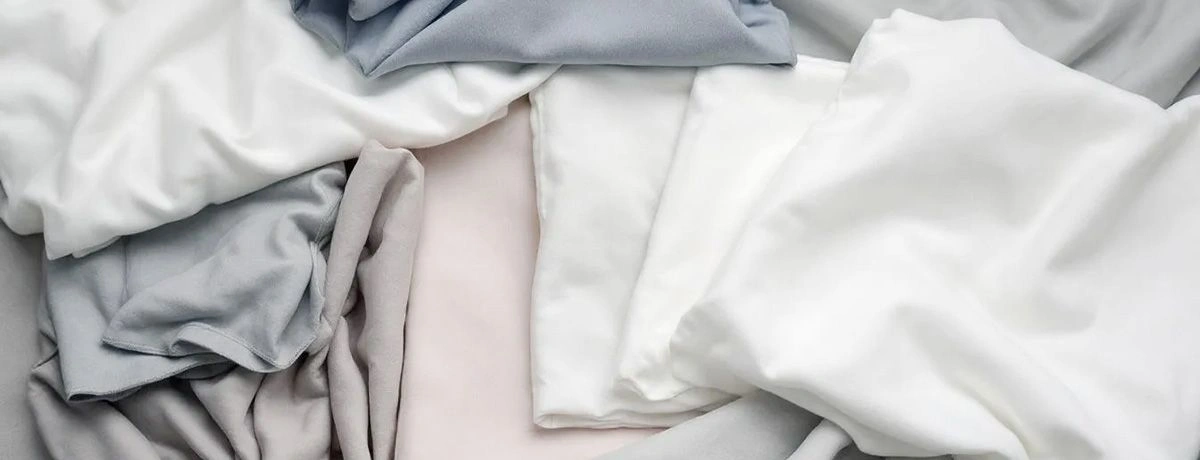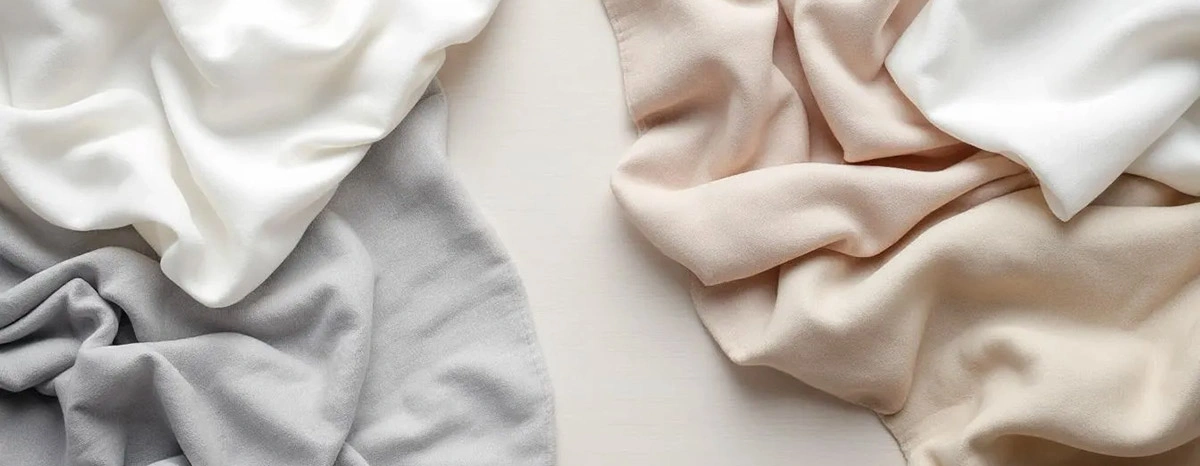Bed Sheet Fabrics: Which Material is Best for Your Comfort?

The fabric of your bed sheets can affect your sleep quality. This guide covers the pros and cons of different bed sheet fabrics to help you make an informed choice.
Key Takeaways
-
Choose bed sheet materials based on comfort and sustainability; natural options like cotton and linen offer breathability, while synthetics like polyester and microfiber are affordable and easy to maintain.
-
Cotton types vary in quality; Egyptian and Pima cotton provide luxury and softness, while Upland cotton is a budget-friendly everyday choice.
-
Understand the weave types and thread count when selecting sheets to match your comfort needs; percale is cool and crisp, sateen is soft and warm, and a thread count between 200-600 is often optimal.
Understanding Bed Sheet Fabrics
Bed sheets come in a variety of materials, each bringing its own set of benefits to the table. The fabric you choose can significantly affect your sleep quality, comfort, and the durability of your flat sheet.
Understanding the different types of sheets of bed sheet materials, from natural to synthetic, helps in making an informed decision that suits your needs.
Natural Materials
Natural materials like cotton, linen, and bamboo are popular choices for bed sheets due to their comfort and sustainability. Cotton sheets are renowned for their breathability, softness, and durability, along with the best material of other materials.
Linen sheets, crafted from the flax plant, provide a unique texture and are celebrated for their durability and eco-friendliness. Bamboo sheets are also eco-friendly, naturally hypoallergenic, and offer a soft feel suitable for various climates.
Synthetic Materials
Synthetic materials like polyester and microfiber offer affordability and low maintenance. Polyester sheets made from synthetic fibers are known for being wrinkle-resistant and easy to care for.
Microfiber sheets are crafted from finely woven polyester fibers, providing a soft and durable option that’s great for families with kids and pets.
Cotton Sheets

Cotton sheets are a staple in many households due to their versatility and comfort. They are favored for their softness, breathability, and overall durability. However, not all staple cotton long staple cotton is created equal.
Let’s explore the different types of cotton used in bed sheets, including Egyptian cotton, Pima cotton, and Upland cotton.
Egyptian Cotton
Egyptian cotton is often considered the gold standard for luxury bed sheets. Its high fiber quality contributes to a luxurious texture and lasting durability. The extra-long fibers of Egyptian cotton provide superior strength and a silky smooth feel that many find irresistible.
Pima Cotton
Pima cotton is another excellent choice for those seeking luxury and quality. Known for being softer and more durable than Upland cotton, Pima cotton offers a similarly luxurious feel to Egyptian cotton but is often more accessible.
Upland Cotton
Upland cotton is the most widely produced type of cotton, recognized for its cost-effectiveness and decent quality. While it may not offer the same level of luxury as Egyptian or Pima cotton, it’s a practical choice for everyday use.
Linen Sheets
Linen sheets are perfect for those who value breathability and durability. These sheets naturally wick moisture away, absorbing up to 20% of their weight without feeling wet.
The breathability of linen fibers allows for excellent air circulation, making them ideal for warm weather and offering long-lasting comfort for all seasons.
Silk Sheets
Silk sheets epitomize luxury with their luxuriously soft and smooth texture, making them the perfect sheets for a lavish sleeping experience. Hypoallergenic by nature, they offer a lavish sleeping experience that supports healthy skin and hair.
However, silk sheets require delicate care, such as hand washing or using a gentle machine cycle with mild detergents to maintain their quality.
Bamboo Sheets
Relatively new to the market, bamboo sheets have quickly gained popularity due to their unique benefits. Made from bamboo cellulose, these sheets are:
-
Soft
-
Wrinkle-resistant
-
Durable
-
Hypoallergenic
-
Breathable
They provide a lighter and silkier feel compared to traditional cotton sheets, making them an excellent choice for comfort and sustainability, especially when considering jersey sheets.
Polyester Sheets
Polyester sheets are cost-effective and wrinkle-resistant, requiring minimal maintenance as they are easy to clean and dry quickly.
While they may not provide the same level of softness or breathability as natural fiber sheets, they are a practical choice for those on a budget.
Microfiber Sheets
Microfiber sheets, crafted from intricately woven polyester fibers, are known for their softness, stain resistance, and durability. They outlast cotton sheets, offering better longevity for daily use.
With a price range that varies, microfiber sheets are an affordable option for many households.
Weave Types for Bed Sheets
The weave type of bed sheets significantly impacts their feel, durability, and breathability. Knowing the different weave types assists in choosing sheets that best match your comfort needs and preferences.
Common weave types include percale, sateen, and twill, each offering different weaves characteristics.
Percale Weave
Percale weave is constructed with a plain weave, giving it a lightweight and smooth texture. Percale sheets are crisp and cool, making them ideal for hot sleepers and warm weather due to their breathable properties.
Sateen Weave
Sateen weave prioritizes vertical threads, resulting in a luxurious, silky, and smooth surface. These satin sheets are better suited for cold sleepers, offering warmth and softness in cooler weather.
Twill Weave
Twill woven sheets are recognized for:
-
Their diagonal pattern, offering both softness and wrinkle resistance.
-
A weave pattern characterized by an over two, under two pattern with a diagonal design.
-
Durability contributed by the diagonal weave pattern.
Thread Count and Ply
Thread count and ply are key factors in determining the quality of bed sheets. Thread count indicates the number of threads woven into one square inch of fabric, while ply refers to the number of yarns twisted together to form a single thread.
Understanding these aspects can help you make a more informed choice when selecting a fitted sheet for your bed sheets.
Thread Count
Thread count affects the sheet’s smoothness and feel. Key points to consider are:
-
A thread count between 200 and 600 is often viewed as optimal for balancing softness, breathability, and durability.
-
Higher thread counts do not necessarily mean better quality.
-
It’s essential to consider overall quality over just the numbers, including lower thread count options.
Ply
Ply is the term used for the quantity of yarns twisted together. This combination creates a single thread. Single-ply threads typically result in softer and more durable sheets compared to those made with multiple twisted threads.
Although thicker sheets may provide durability, they might lack the breathability of thinner sheets.
Choosing the Right Bed Sheets
Choosing the right bed sheets involves considering material, weave, and budget. Whether you prefer the crisp feel of percale, the silky smoothness of sateen, or the durability of twill, understanding these elements helps in making an informed decision that aligns with your personal preferences and needs.
By Material
When choosing bed sheets based on material, consider your comfort and personal preferences. Twill sheets offer a heavier, softer feel, while percale sheets and flannel sheets are recommended for their cooling properties.
Also, consider hypoallergenic or moisture-wicking needs when selecting sheets.
By Weave
The weave type significantly influences the feel and temperature regulation of bed sheets. Percale sheets are ideal for hot sleepers due to their crisp, cool feel, while sateen sheets offer a silky, smooth feel perfect for those seeking warmth.
By Budget
When considering budget, balance quality with affordability for long-term use. High-quality sheets are available at various price points, so it’s important to weigh cost against material and weave quality to get the best value.
Care and Maintenance of Bed Sheets
Proper care and maintenance of bed sheets can extend their lifespan and keep them comfortable and fresh. Key care tips include:
-
Washing sheets weekly in warm or cold water to maintain freshness.
-
Using nonchlorine bleach to prevent fabric damage.
-
Tumble-drying on medium heat to minimize wrinkles.
Ensure sheets are completely dry before storing them to prevent mildew.
Wholesale Order
For bulk purchases, MH offers high-quality bed sheet fabrics for wholesale, making them a reliable choice for bedding manufacturers worldwide. MH provides:
-
Over 20 years of experience
-
Consistent quality
-
Reliable service
-
Competitive pricing
They focus solely on wholesale, ensuring factory-direct prices and fast global delivery.
Summary
Choosing the right bed sheets involves understanding the different materials, weaves, and other factors that affect their comfort and durability. From the breathability of linen to the luxurious feel of silk, each type of fabric offers unique benefits. By considering your personal preferences, budget, and the care required for each type of sheet, you can make an informed decision that enhances your sleep quality. Remember, the right bed sheets can transform your bedtime experience, making every night a restful retreat.
Frequently Asked Questions
What is the best material for bed sheets?
Cotton is often considered the best overall for bed sheets due to its versatility and breathability. However, if you want something luxurious, silk is a great choice, while bamboo is perfect for an eco-friendly option.
What is a good thread count for bed sheets?
A good thread count for bed sheets is typically between 200 and 600, as this range offers a nice balance of softness, breathability, and durability. Remember, higher isn't always better!
How often should I wash my bed sheets?
Washing your bed sheets weekly is the best way to keep them fresh and hygienic. Trust me, your sleep will feel so much better!
What are the benefits of linen sheets?
Linen sheets are a fantastic choice because they’re breathable, moisture-wicking, and super durable, making them perfect for staying cool in warm weather. Plus, they’re eco-friendly and will provide you with long-lasting comfort!
Are polyester sheets a good option?
Polyester sheets can be a great option if you're looking for something budget-friendly and low-maintenance. Just keep in mind they might not feel as soft or breathable as sheets made from natural fibers.


